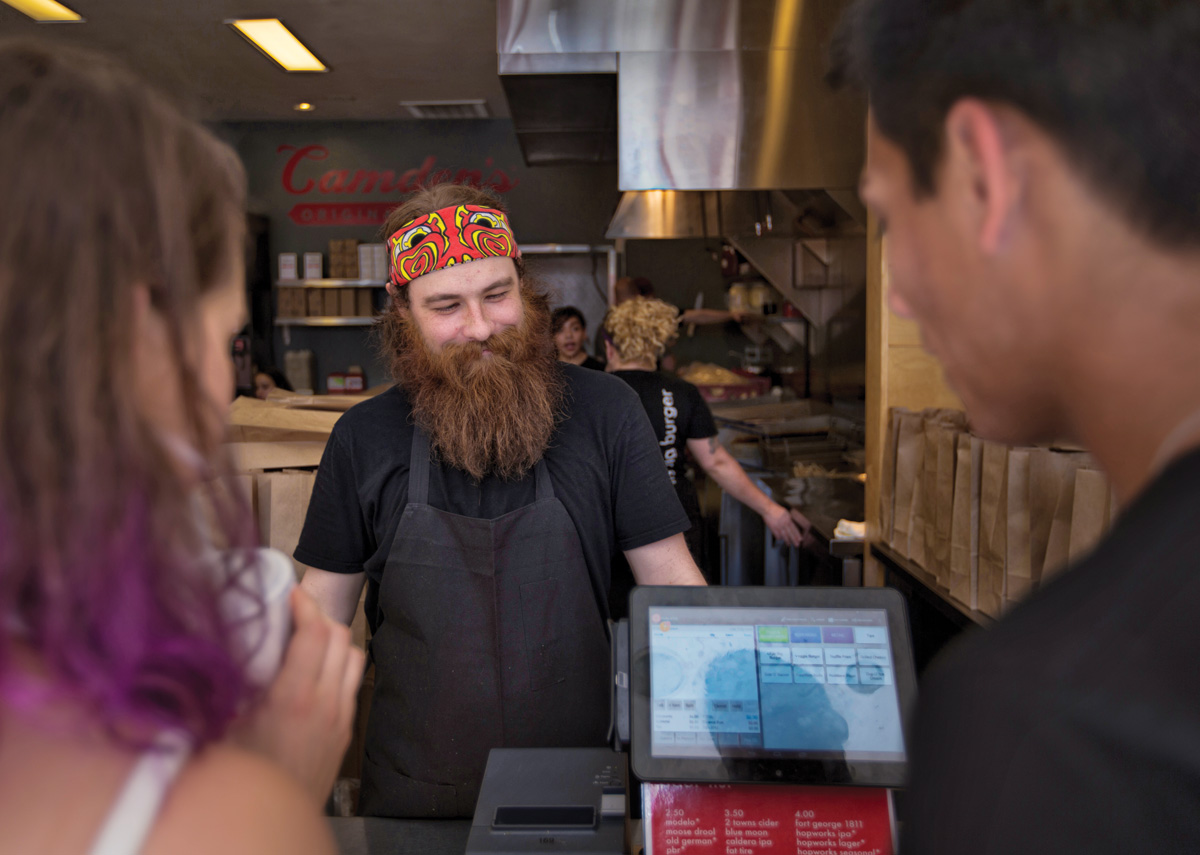Blockchain is the new buzzword about town, often touted as the tech-integrated future of commerce. But the implications of this nascent system are just now coming to light, presenting unique opportunities for the restaurant industry, from the customer experience to supply chain sourcing to financials. At its most basic level, blockchain is a digital, peer-to-peer ledger that stores encrypted data in a way that is virtually fraud-proof.
For Chanticleer Holdings, blockchain presents a chance to break the traditional rules around loyalty platforms. Rather than forcing customers to frequent an individual restaurant, the North Carolina–based restaurant group will allow for shared earning and reward opportunities across several of the company’s brands. Chanticleer’s loyalty vendor put it this way: It’s like earning Delta frequent flyer miles only to redeem them on United Airlines. For the restaurant operator, that means its customers can earn credit by purchasing a chicken sandwich at Little Big Burger and redeem it on a cheeseburger at sister concept BGR.
“That was the appealing part for us,” says Michael Pruitt, chairman, president, and CEO of Chanticleer Holdings. “But at this point, it’s an idea. It’s a beta project.”
Little Big Burger and BGR don’t offer loyalty programs, and Pruitt believes the blockchain-enabled loyalty program offered by Mobivity will prove especially popular among fans of BGR and Little Big Burger. He says both brands enjoy a cult-like following, particularly within the millennial set.
Chanticleer also operates franchised restaurants under the Hooters, Just Fresh, and American Burger Co. banners. While Pruitt acknowledges the technology surrounding blockchain is still emerging, he believes it has great promise in the restaurant space because of its ability to seamlessly and safely collect consumer data.
“We’re excited to be the beta tester,” Pruitt says. “I’m sure there will be peaks and valleys and left turns and right turns. But any time you’re talking to your customers and consumers about how to make things better, that will only benefit us.”
Across the industry, several restaurant brands are dabbling with peer-to-peer blockchain technology, testing its use on everything from loyalty programs to supply chain tracking. Because blockchain was the technological backbone that launched cryptocurrency bitcoin, it’s closely associated with the highly volatile virtual currency. But experts say blockchain has distinct applications apart from cryptocurrencies. The technology allows users to share data across a decentralized system that is open and anonymous.
“It’s really just a way of keeping track of things and doing that in a way that’s truly transparent,” says Dennis Becker, CEO of Mobivity. “Everyone has a copy of the records versus one person or one entity having one, all-inclusive database and governing who has access to it.”
Instead of a consumer’s banking records being housed solely on Chase’s server, the blockchain could host the records online where everyone can see. It may sound risky to have such information available to multiple parties, but the technology can include safeguards. In the case of a banking account, parameters could ensure that only certain users have access to certain parts. Toyota could have access to the transaction data surrounding a car payment but lack access to a customer’s banking balance or records of his purchases at the gas pump.
Mobivity’s blockchain-enabled loyalty program works across businesses and brands. Essentially, a customer could earn loyalty points for purchasing a Subway footlong. Those points could then be redeemed for a hamburger at Wendy’s or even for something entirely different, like a trim at Supercuts. Becker likens it to the agnostic approach of reward programs that allow customers to mix and match airline miles for hotel nights or rental car points.
“All of a sudden these possibilities open up,” he says. “We see this future where commerce just opens up.”
The complex world of supply chain management may prove to hold some of blockchain’s biggest potential for restaurateurs. Starbucks piloted a bean-to-cup blockchain product to track its primary ingredient. Sweetgreen has reportedly tested a blockchain product to track its tomato supplies from farm to store. And Bloomin’ Brands is experimenting with a blockchain solution that helps manage supplies in the case of a food safety–related recall.
Juan Guerrero, senior vice president and chief global supply chain officer for the brand, believes blockchain’s potential has been overhyped because of the momentous growth of cryptocurrency values (the value of a single bitcoin skyrocketed from less than $1,000 in value to nearly $20,000 in 2017). Nevertheless, he believes the technology may hold some potential, if limited, for the restaurant industry.
“For us, it’s really a question of data quality, low-cost interfaces, and an application layer underneath that’s about security more than anything else,” Guerrero says. “The scope of it is really narrow. … It’s very early.”
In the future, blockchain could allow for company executives, customers, and government agencies to follow the food supply from source to store, says Manik Suri, founder and CEO of CoInspect, a multi-application software platform. CoInspect is collecting the data now that will populate the open-source technology in the future. By pinpointing the source, transportation route, and time in transit of each ingredient, operators and distributors can quickly react to a food-safety crisis, immediately flagging problems.
“We think the world is moving towards more consumer empowerment and more transparency over time,” he says. “I think there will be a lot of interesting development here as brands realize it’s in their interest to use this information and share it.”











